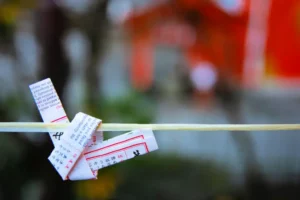
Omikuji: The New Year’s Fortune
Omikuji, which means “sacred lot”, is a popular and traditional way to learn about your fortune in Japan. You can find it at Shinto shrines and Buddhist temples nationwide.

Omikuji, which means “sacred lot”, is a popular and traditional way to learn about your fortune in Japan. You can find it at Shinto shrines and Buddhist temples nationwide.

Joya no Kane is an important ritual during Japan’s annual Omisoka (New Year’s Eve) celebrations. Japan has practiced this ancient tradition for centuries, carrying a profound Buddhist philosophy.

Alongside koi fish, other animals like cranes, deer, cats, and tanuki carry powerful meanings in Japanese tradition. These creatures represent values such as harmony, hope, and adaptability.

Japanese snacks, including wagashi (traditional sweet) and Japanese peanuts, hold a special place in the country’s culture.

Recently, the webseries “Jun’s Kitchen” highlighted Seki Seika Confectionery (関製菓本舗), a family-run workshop known for its century-old commitment to crafting high-quality Japanese sweets.
Join our newsletter and receive tasty news and deals
Thanks! We just sent you an email to confirm your subscription. To finish signing up, please click the confirmation link in the email.
Error